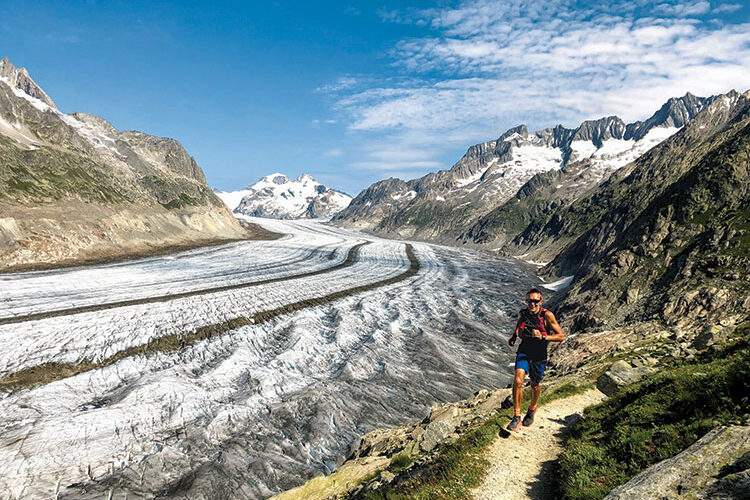Near the edge of Utah’s Wasatch mountains lives Jake Krong ’06. Every morning, he wakes before the sun rises and ascends the Big and Little Cottonwood Canyons — using skis when it’s snowing and sneakers in the warmer months.
After trekking back down, Krong spends his workday organizing clinical trials and running an organ transplant research department. During the COVID-19 pandemic, he’s also been brainstorming ways to help patients get the care they need without putting them at risk.
After work, he takes it easy … with a quick hike or run.
Spend some time in Krong’s Saucony running shoes, from working out to working in health care.
“I wake up around 4:30 or 5 a.m. Being in the mountains as the sun rises energizes me.
“Ski touring is basically getting up mountains by your own power using backcountry skiing equipment. In the winter, I’m climbing mountains every morning in the dark by headlamp and then skiing down
at sunrise. In the summer, I’m running
those trails.
“Sometimes my wife and I ski three or four hours before work. In the summer, I run for an hour or two. It’s been 20 years of rigorous endurance training. That’s what makes me tick. [If] I don’t do it, I feel off.
“[Since the outbreak of COVID-19] I do a mix of working from home and working from the office at Intermountain Medical Center in Salt Lake City.
“I’m the operations manager of the liver and kidney transplant research program. We’re the lead site nationally on a study where we’re looking at a new way of transporting and preserving livers prior to transplant. We’re putting them in this investigational device, essentially a pump, and we’re keeping the organ working during that time when it normally would just be sitting on ice. This might lead to better outcomes, or might buy us the time needed to procure organs for patients when we otherwise might not have time to keep the organ healthy.
“I’m also the operations manager for Intermountain Healthcare Delivery Institute, where our mission is to take cutting-edge research findings and evidenced-based practices and get them into routine practice across our entire system from our flagship medical center to rural clinics. We try to constantly learn from what we are doing and adapt to best serve our patients.
“I’m the person who manages all aspects of logistics. I am lucky to support many brilliant clinicians and researchers, and I help implement their ideas in real life. I’m working with physicians, nurses, [and] sometimes patients. In the background, I’m ensuring regulatory compliance, financial stewardship, and data integrity. I’m a jack of all trades for the departments I support.
“Everything changed when we started to realize what was happening with COVID and how we would need to find better ways to treat our patients. Most centers don’t have infectious disease research programs on the scale needed for this pandemic. We had to shift resources from all the different research groups, and bring people together to become our COVID research team.
“My job pivoted to become the director of our investigational treatments for outpatients statewide. We had to figure out ways to deliver care in the context of clinical trials without having one-on-one contact between our research staff and patients.
“[We’re now applying these new methods to] our liver and kidney transplant clinical trials for the patients’ benefit, and also for our caregivers [and] researchers, leveraging telemedicine whenever possible.
“Usually, after work, my wife and I go for a run or a hike. We have at least 15 trailheads within 15 minutes of our house, so there’s never any lack of options to get your heart rate up.”

